WNBA President and former Vice Mayor of the Atlanta City Council, Lisa Borders knows that humans make up a business and that business has a long way to go in supporting humans. Because of that, she’s spent her life moving across sectors – from Coca-Cola to nonprofits to government and now, the nation’s longest standing female sports league (and youngest sports league overall), where she is backing a player led athlete activist movement to bridge the gap between the personal, the political, the business, and sports. In our interview, Lisa shares more on her defining experiences and what it was like for her to be one of the first Black children to integrate a private school in the South, how her WNBA players are helping lead the athlete activist charge, and how our generation should face adversity.
Learn more about Lisa Borders, the president of the Women’s National Basketball Association and her advice for the next generation of women leaders:
Her Agenda: First of all, I have to say it’s a huge honor to interview you. I started playing basketball a couple years after the WNBA got started and I remember having posters of Lisa Leslie and Sheryl Swoopes in my room, and all these WNBA advertisements to “play like a girl” in my scrapbooks. It’s a huge honor to be on the phone with you today and to have the opportunity to share what the WNBA is doing now in this day and age.
Lisa Borders: Well, thank you so much for that. And listen, likewise. As my friend Andrea Jung who was the former CEO of Avon said, it’s always nice to be the first to do something. You never want to be the last. So, when I have an opportunity to speak with women like yourself, it’s like the pipeline is being pumped for women of your generation to take the baton and run the race even faster and harder than the women who have come before you. So, thank you for your time and thank you for your interest.
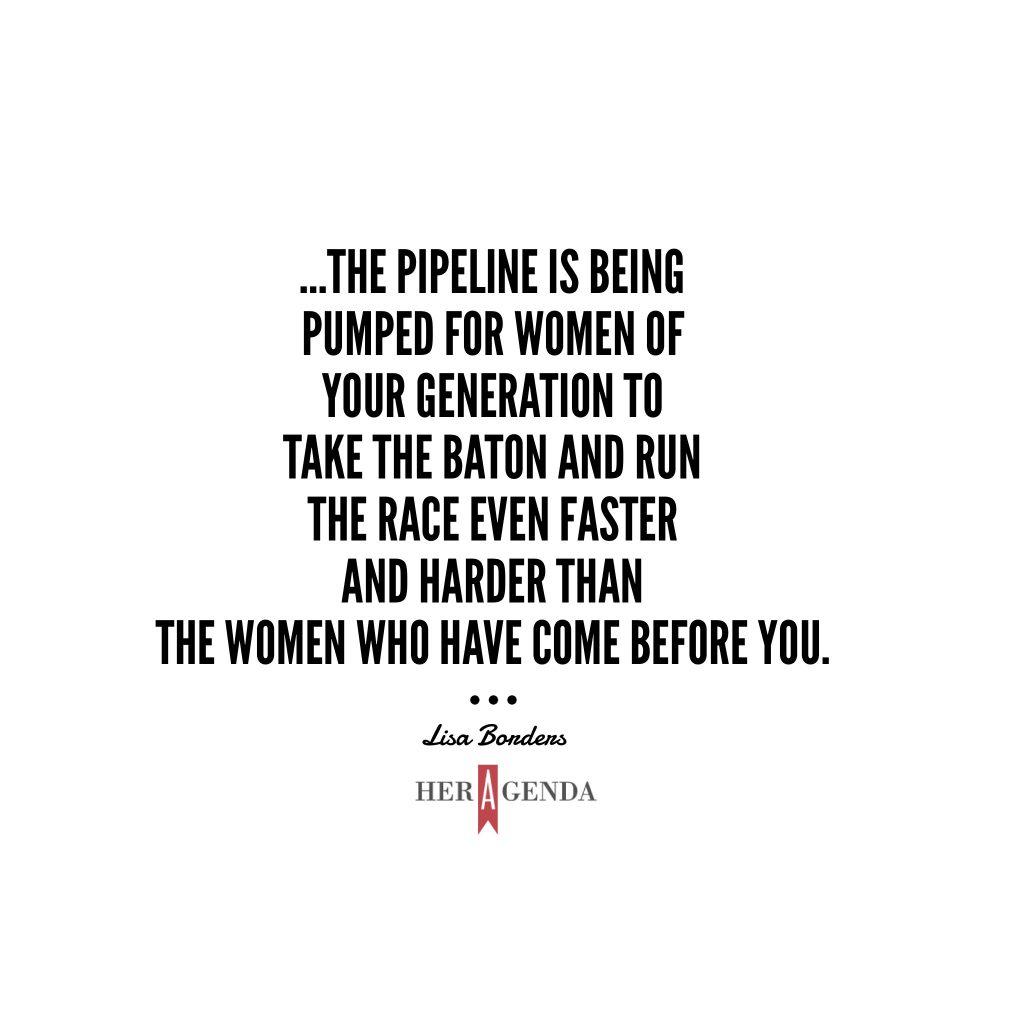
Her Agenda: Thank you for that! Tell me a bit about yourself. You grew up in Atlanta, you went to Duke. What was the origin story of you?
Lisa Borders: I did grow up in Atlanta and I am a product of the Civil Rights era. We all, of course, are beneficiaries. But I was a direct participant in helping integrate a school in Atlanta and I subsequently applied to Duke and was accepted on early admission. It was a difficult time in the country while I was growing up. Title IX wasn’t passed until 1972. I graduated from high school in 1975. So [it was all] right at the height of the civil rights era. My grandfather was a Baptist minister for over 50 years at a church named Wheat Street Baptist Church which was incredibly engaged in social issues of the day. My grandfather had a cross burned on the yard by the Ku Klux Klan for the type of ministry he was preaching. It was about inclusion at that time – about self-sufficiency. It was about everyone supporting everyone in the community. That was a time [in my life] when my core values were developed. Not only about how to govern myself but how to think about serving others.
I grew up in a household of high expectations but where education was considered the leveler of all playing fields. So I’ve always had a passion for – not just academic experiences – but life experiences. Academically, I had the pleasure and experience of attending the school I went to from seventh through twelfth grade – the Westminster schools. It was the first independent school in the south to integrate in 1968, I believe. I went in ‘69. The academics were very rigorous – that’s why I went there. But the life lessons that I learned about overcoming adversity and perseverance are many of the lessons that you learn in sport. I didn’t play sports then. I’m not an athlete by traditional definition. I was a cheerleader. I was the first African American cheerleader. Which perhaps, doesn’t sound like that great of an accomplishment but at that time, it was a huge accomplishment.
I have lived a blessed and privileged life because there was a recognition that I needed certain tools to be successful in life. And it started with core values about integrity and serving others and being self-sufficient. But that was complemented with the academic rigor, as well as the adverse circumstances at a very, very early age. So, when I find myself forty years, fifty years forward in 2018, running a league where we oftentimes find ourselves running into adverse circumstances, I harken back to the lessons I learned as a little girl about ignoring the noise that’s around you and staying completely focused on what your core mission is. In high school, it was getting my diploma. In college, it was getting my degree. In the WNBA, its ensuring that this league is not just surviving, but that it is thriving.
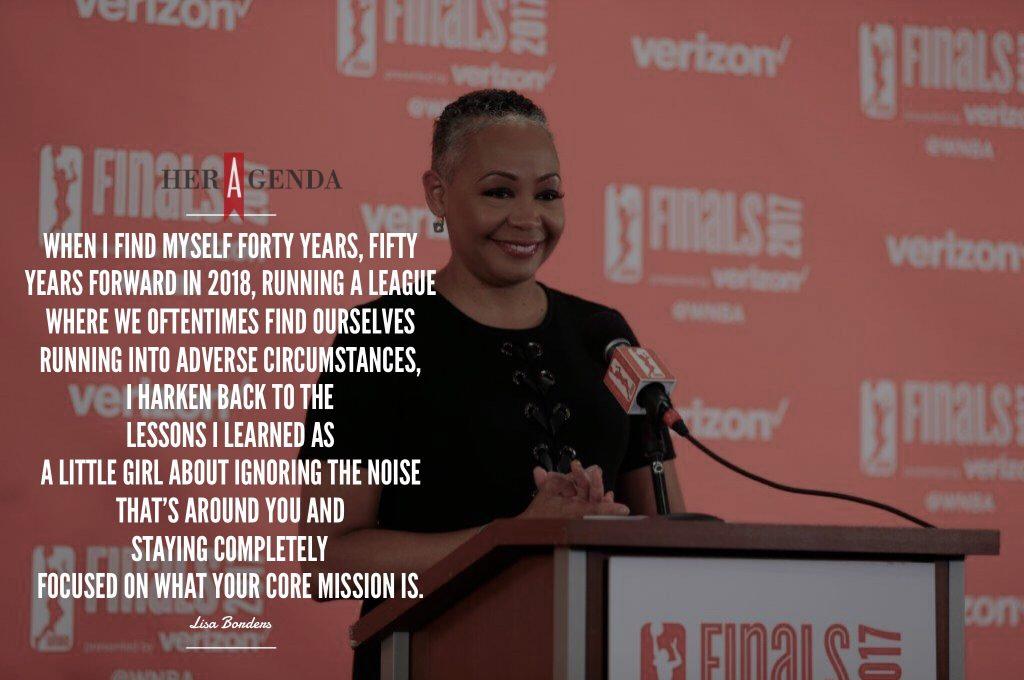
Her Agenda: Your career trajectory hasn’t been limited to one sector, but rather, you’ve moved across corporate, nonprofits, government, and now onto pro sports. Why the diversity across your career path and what compelled you to move across those sectors?
Lisa Borders: I was very opportunistic. I often used the lens of my skillset versus what was being asked of me. For example, at the Coca-Cola company, it was the opportunity to travel the world and impact communities around the world.
If you look at all the positions I’ve had, every one is in service to a disenfranchised group. At Coca-Cola, it was traveling primarily to international markets, emerging countries, and continents where Coca-Cola had a foothold as a consumer products company, but where people in those communities had not yet reached their full potential.
At Grady Health System, I had the privilege of working at the level one trauma center. It was the only one Atlanta had at that time. To give you context for that, New York has, I think, nine level one trauma centers. So, those roles, or that particular role at Grady was servicing those who had inadequate healthcare. The same is true for the WNBA. The women that play in this league are incredible athletes. But they don’t have full parity with their male counterparts in male-dominated sports leagues.
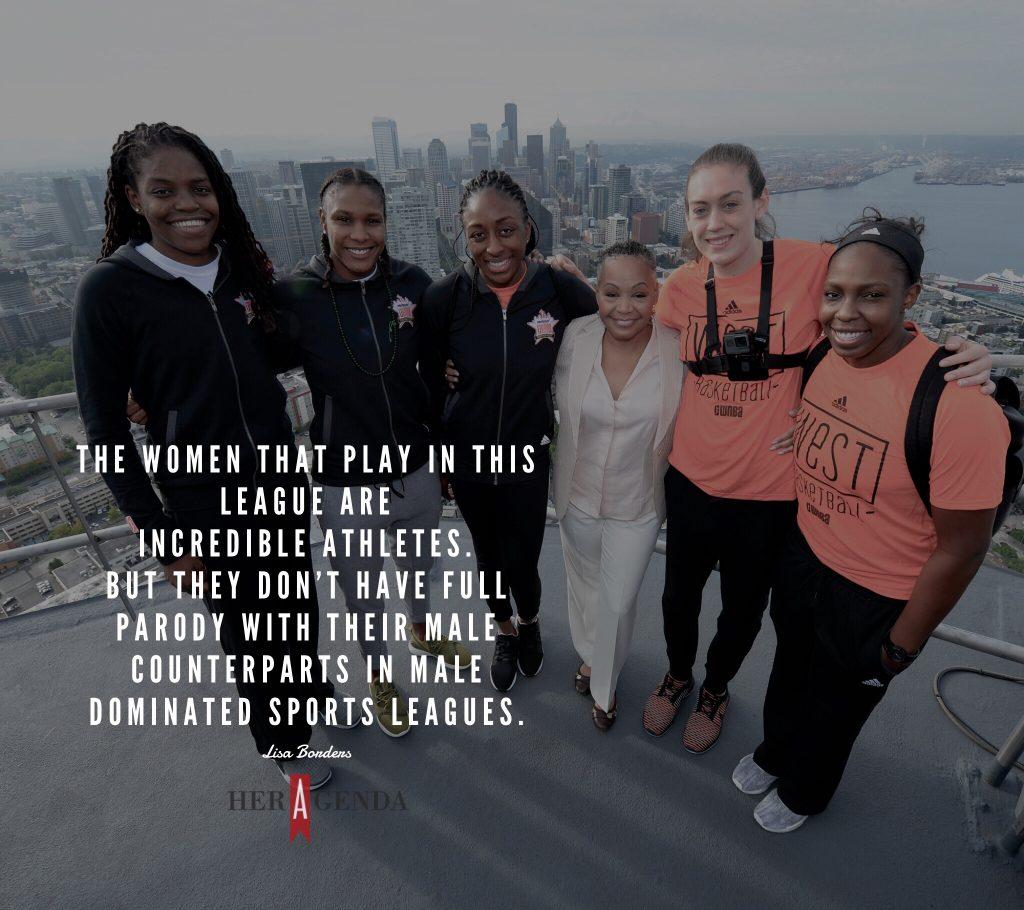
So in each one of those roles, I didn’t start out thinking I could have a diverse portfolio of experiences from a professional perspective. I would think through – number one – if I could present value and number two if I could learn. Each time, I took a new role, I answered yes to both of those questions.
Her Agenda: Going back to your history with the WNBA – that started earlier than what most people might know. Your history with the WNBA started over ten years ago back when you were in Atlanta. Can you tell us a little bit about the story of how you were able to bring the WNBA to that city?
Lisa Borders: I was serving as Vice Mayor and president of the Atlanta City Council and I actually took a meeting for the mayor. [The mayor] was Shirley Franklin at that time. She was supposed to meet with one of my predecessors, Donna Orender of the WNBA. Donna was interested in expanding the league and bringing a team to Atlanta. As you know, there are 16 or 18 Division I schools in the Atlanta Metro region. So there is certainly a large talent pool for the WNBA in Atlanta. Though it’s not New York, there was (also) certainly a large media market. At the time – and this is still true – the demographics of the city showed over 2 Million people coming into the city over the next ten or fifteen years.
Donna had looked at all of that empirical data. She was coming to the city to make a pitch for us to have a WNBA franchise. I attended that meeting and decided it was a good idea for us to pursue it. When I went back to the City Hall to tell the Mayor I thought we should pursue the franchise, she told me, “I told you to take lunch. Not a team. So you’re going to have to work on that because I’m working on the budget. I don’t really have time to work on that.”
That became my project, and frankly, my pet project. I put a group together of nine women. Women that I knew, women who had certain skill sets. We called ourselves the circle of friends. We ended up bringing the Atlanta Dream to my home city. That was in 2008. So I had that experience by some would say happenstance, some would say it was synergy. Some would say it’s a coincidence. One of my mentors, Ambassador Andrew Young said, there are no coincidences in life. Coincidences are God’s way of remaining anonymous.
That experience helped prepare me for the job I had today. I was intimately familiar with the league – with all of its positives, but also with all of its challenges – I was aware of ten years ago.
Her Agenda: Talk to me about where the WNBA is in right now, as opposed to when you came into the league, as well as where you see it going.
Lisa Borders: The WNBA is in a good place. We are improving everyday. We are improving every season. Just as our players have to go into the gym everyday to tone and re-tone their muscles, we have to do that for this business. That’s what any good business does. When I had the privilege of accepting this position, attendance was flat and declining in some markets. We have reversed that trend. As I mentioned at the top of our call, all of our key performance indicators – whether its attendance, viewership, merchandise sales, or distribution of our content – everything is positive. We are on a much more sustainable trajectory. On the court, the game has never been better. Dina (the Senior Director of Women’s NBA) always reminds me how many points are being scored, how many three-point shots are being taken, what the success rate is, and what the free-throw percentages are. The elite athletes we see performing in the W everyday are better than any athletes we’ve ever seen in the game. So on and off the court, we are making progress.
Where are we going? We want to accelerate the progress. I say we’ve made incremental change and incremental advances. We’d like to see some leapfrog advances if you will. We’d like to see more sponsors dedicated to the W. There’s a lot of talk today about supporting women. Inspiring women. Empowering women. Well, that’s our primary mission.
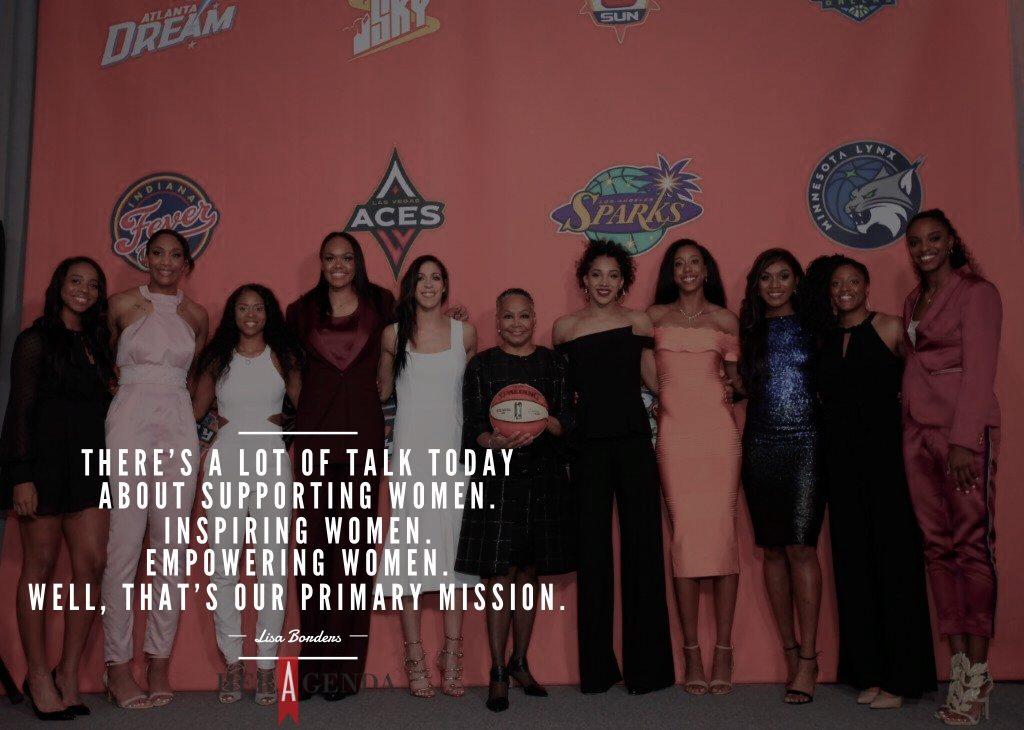
We’d like to see more sponsors, we’d like to see less sexism, we’d like to see less misogyny, we’d like to see more women being given an equal opportunity to demonstrate their abilities without being prejudged or folks having preconceived notions about what they think women can or can’t do.
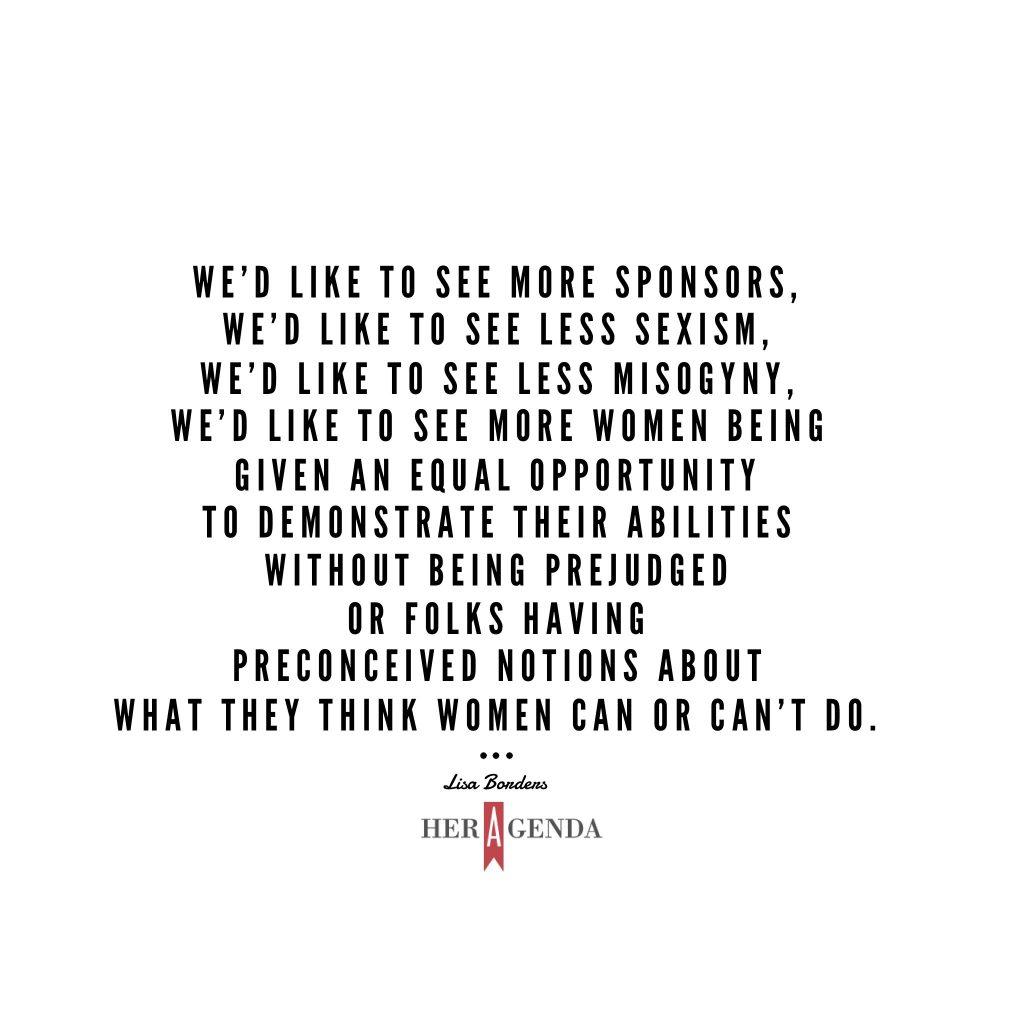
Her Agenda: How is the WNBA using social media marketing to reach broader audiences that maybe aren’t in the major metro area, and also, you know, kids on their phones?
Lisa Borders: Let me start with the Twitter partnership we started last season. It’s a three year partnership, at least for now – we think they’ll probably want to do it longer. We know we will want to do it longer. It’s a new distribution channel for us. They streamed 20 games for us last year, and think they are going to do a little more than that this year. But it was highly successful. We were new. We were making history with being the first women’s league to livestream on Twitter. We found it very, very exciting. The fans seem to love it. We had 613,000 fans viewing on average. That’s a nice big number, right? That says there’s success there. There’s an appetite to have the content we were sharing to have it streamed live on twitter. Also we are finding that when we share our highlights of our games, when the players are playing, that they are consumed at exponential rates. That’s been one of the crown jewels, and one of our crowns of success (to see) how much folks have been interested in the highlights and the games.
Where we see even greater opportunity, is to talk about the players off the court. To talk about the players as individuals. Let’s call it lifestyle. People are interested in who our players are. Do they have pets? Do they have plants? What kind of foods do they like? What kinds of hobbies do they have? This whole notion of the authentic person, and opening themselves up. Being a little bit more vulnerable, if you will. Because on the court, they are absolutely perfect. Off the court, they are people, just like you and me, right? The greatest opportunity we think is on social. Whether its YouTube or Snapchat or Instagram or any of the other platforms that have yet to be invented or yet to become popular, we think that is a path we will most assuredly continue to take, and we will continue to experiment.
Her Agenda: Let’s talk a bit about the culture the WNBA is building. It’s so exciting to see an organization – particularly a major sports organization – stand behind athlete activism. The WNBA has been doing that from the get go of this movement. What was that process like for this organization? What was your role in helping your organization navigate those experiences?
Lisa Borders: Well it all starts with the players. It started with the players and it continues with the players. When you see our players play, you see how compelling it is, what they can do. They can twist their bodies into pretzels. They can dunk balls. They can sink a three point shot…it’s incredible what they can do as professional athletes. Compelling.
When you listen to them speak – remember they are all college graduates or the equivalents from the international markets. That’s a distinguishing attribute for our league from any other league, male or female. We require four years post high school, for even, eligibility for the draft, to the W. These women are global citizens because they have two jobs, in essence, most of them. They play with us from April to late September. And then they play – many of them – in the international markets from October until early May.
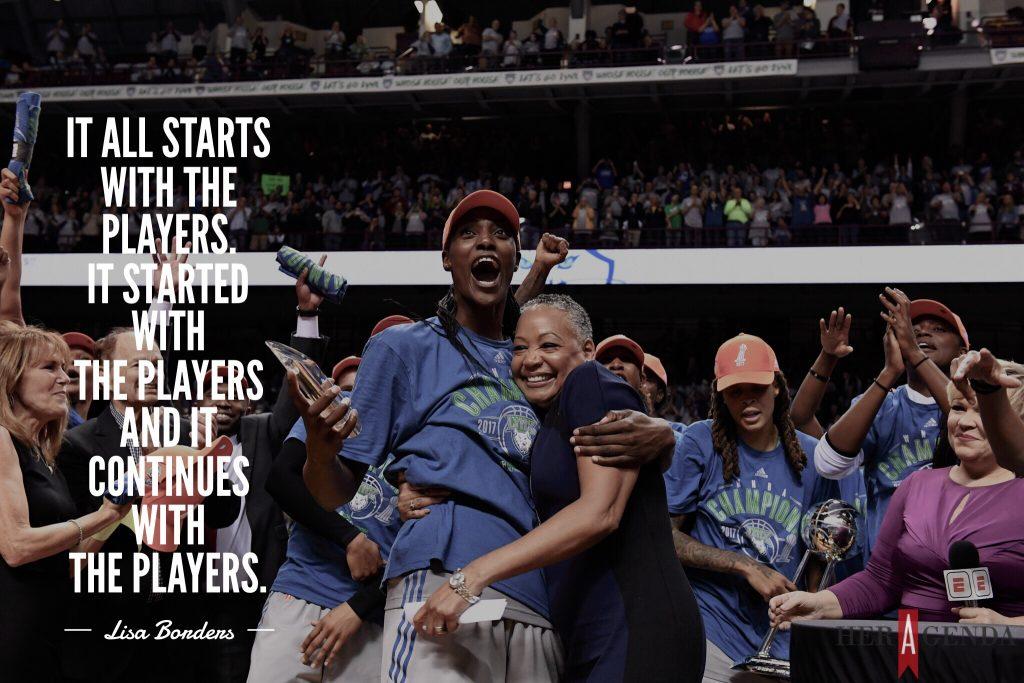
Many Americans, if not most Americans, never leave their home city, county country or continent. 80% of our women leave our country every year. So they are counting money in a different language on a different continent, in a different country. They are conversing with people. They are global citizens. They are educated and they are global citizens. So let me tell you, they are compelling on the court. But they are absolutely courageous in how they are looking at things across the globe. Not just in the U.S. but all across the globe. When I look at them, I am inspired. Because they take those experiences and they turn them into commitments to their fellow citizens. Global citizens. When they make a statement about political or public policy or political action, or inaction, that’s courage.
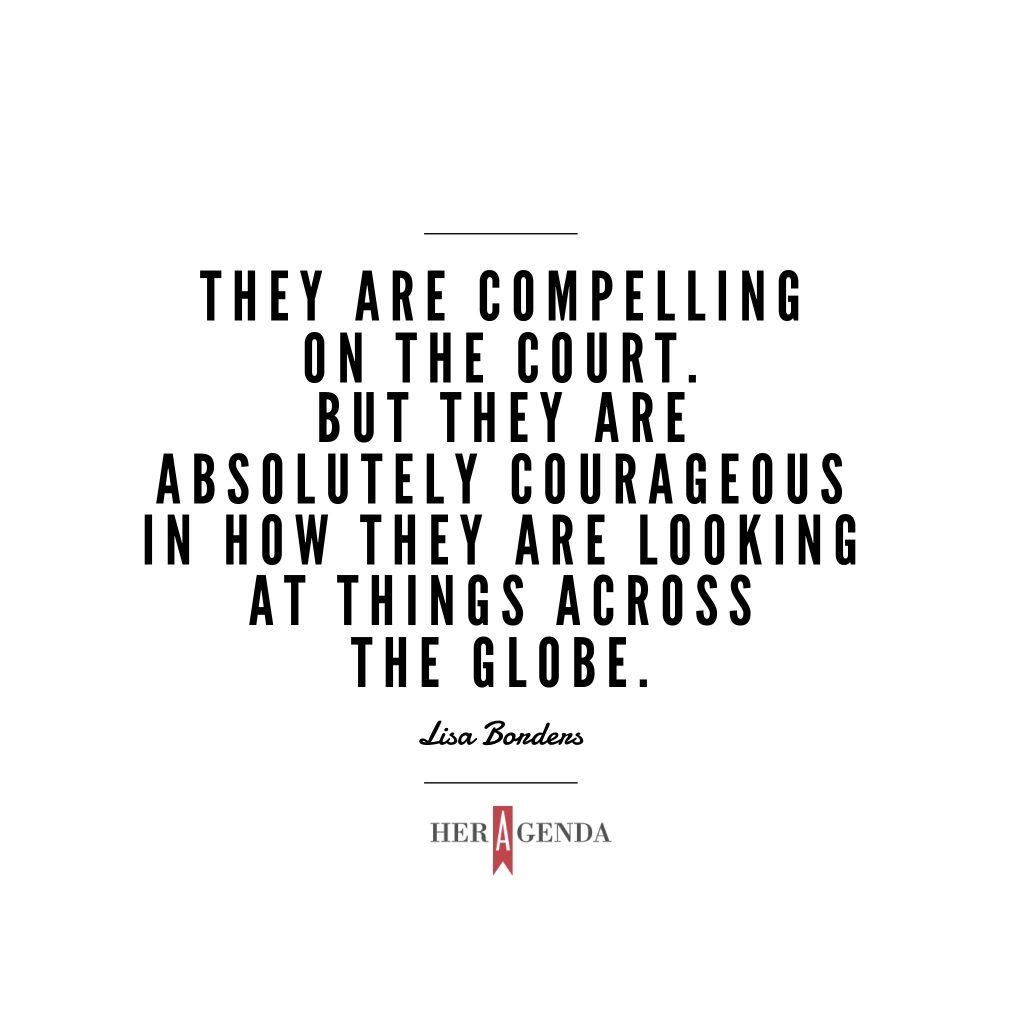
We launched a campaign called Take A Seat, Take A Stand. When you buy a ticket to a WNBA game, we are actually contributing five dollars of that ticket to one of six national organizations. The teams are also being encouraged to select local nonprofits. This is the DNA of the WNBA. We are interested in supporting our communities – our team communities as well as our players’ home communities. So when they are working and they are playing for the Minnesota Lynx or the Chicago Sky or the LA Sparks or the Seattle Storm, they want to make sure they are giving back to that community, just in the way that community is giving to them by coming to the arena or watching on TV or watching on League Pass.
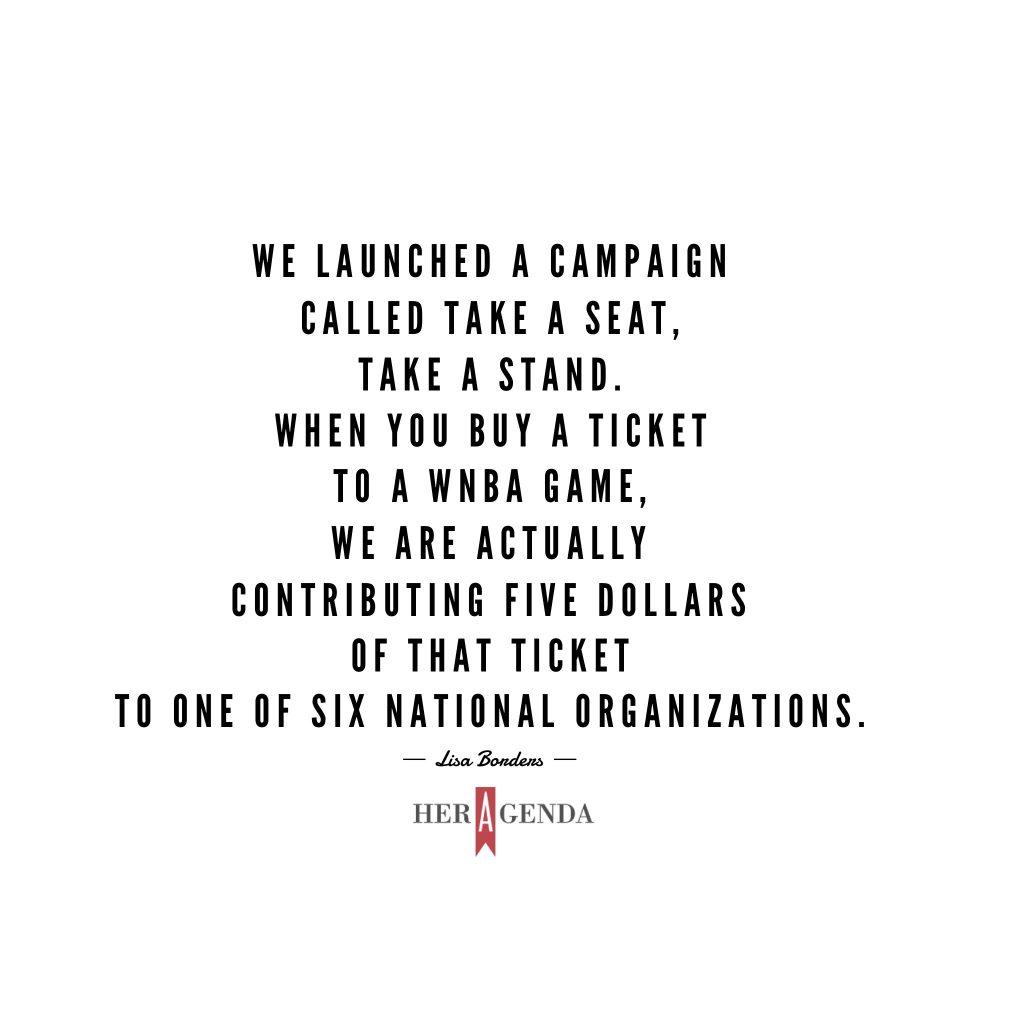
Take A Seat, Take A Stand is an affirmative step by the league to embrace what our athletes are doing. And that is to stand on the sports platform called the W with a megaphone, and say, “we believe in supporting one another. We stand for change. We stand for equality. We stand for us. We stand together.” Take a seat, take a stand, is our official mantra today.
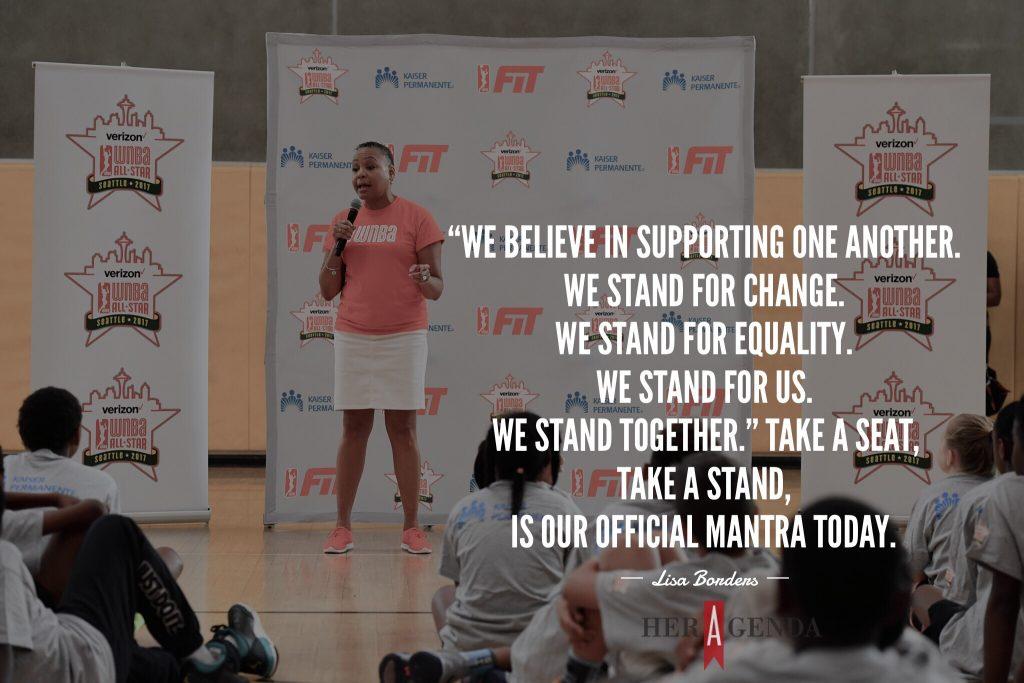
Her Agenda: Tell me a little bit about the organizations you chose. I know Planned Parenthood is one of the organizations, GLSEN is another. What kind of thinking went into the selection of the six major organizations?
Lisa Borders: What we try to do is look at things where our players have expressed interest previously. Some things are just a natural fit, like The United State Of Women. We want to make sure that our core constituent group is supported. The LGBTQ community is being supported by GLESN. MENTOR is education. What we tried to do is pick areas that are overarching where we knew many of our players already had their fingerprints – they are already working in these spaces. But we tried to pick organizations that were national – that could cover all twelve of our markets and that would be both relevant and resonant.
Her Agenda: What is the overarching impact that you’d like to have with Take a Seat, Take a Stand for the communities that are out there watching the WNBA.
Lisa Borders: I think the point here, it that the WNBA is bigger than basketball. Basketball is what we do. It’s not who we are. We are absolutely proficient at our product. Our product is the game on the floor. Our elite athletes play that game incredibly well. But in addition to that, they are cutting a historical path. Remember, we are just going into our 22nd season. Even though we are the longest running women’s professional league, we are still the youngest professional (sports) league. Come on – baseball is 125, Football is 100. The NBA is 72. We are 22. The NBA has two generations – 50 years – on us. So our women are cutting a historic path. Not only for themselves but for the generations that come after them.
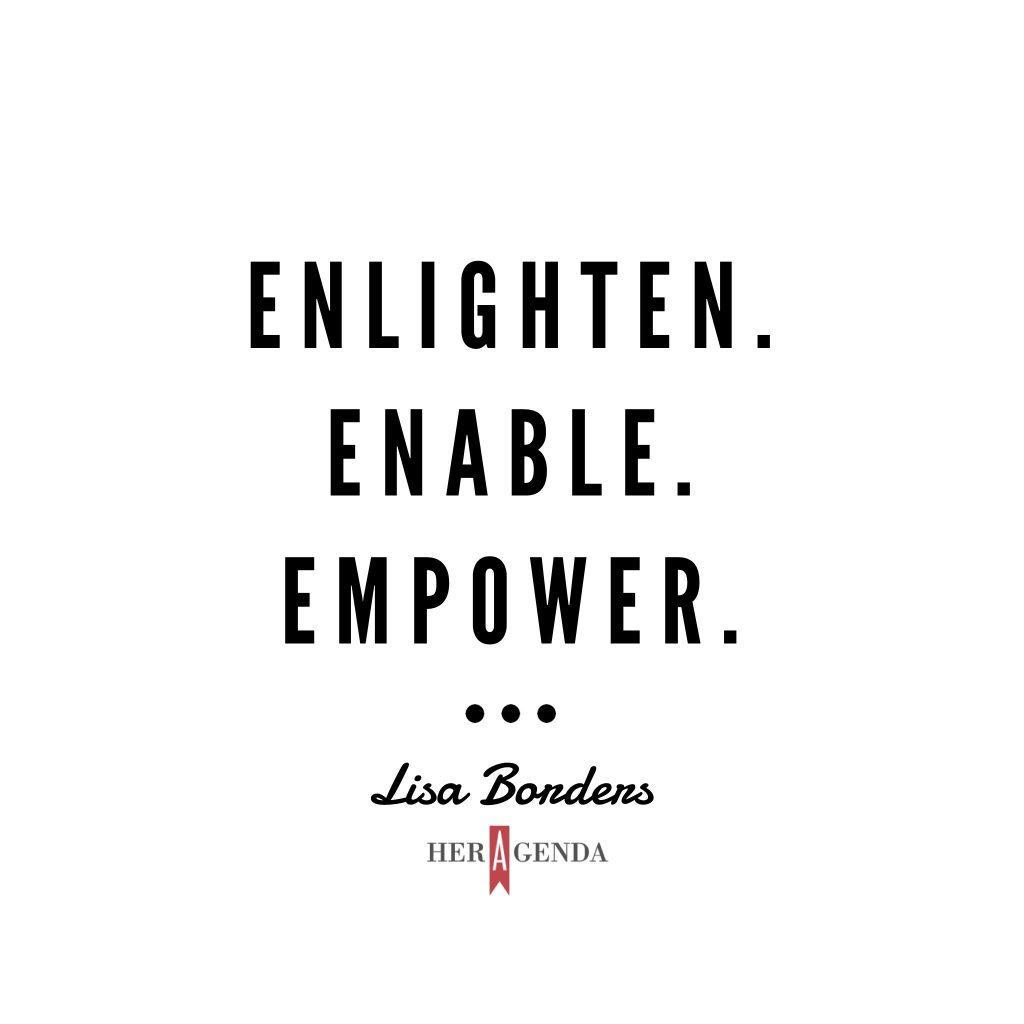
Her Agenda: Do you have any advice or guidance for women out there who will be reading your story?
Lisa Borders: This is what I would tell them. They should enlighten. They should enable. And they should empower. So enlighten – most times when I was faced with people who didn’t believe I could do something when I was younger, I became very angry. Anger is pain. So rather than become angry- because you can’t think when you’re mad, as my mother always reminds me – you should take the opportunity to enlighten. Which means you should have a conversation with the person, and ask them why they think that? Or give them data that pushes back on their preconceived notions or invite them into a conversation. That would be enlighten. Enable, is to give them the tools that help them understand that what you’re saying is not just your opinion, but is grounded in fact. Often times, we have these extreme opinions, and they are so misinformed, or misguided. Because people just don’t know the facts.
When folks talk about whether players in the W really can play basketball, many times they’ve never seen a game. Enabling them might be to come to a game with you, or watch a game on TV, or learn about the players. Whether it’s coming to a game or playing FanDuel – you know the fantasy games we are partners with.
Finally, I would say, empower. When you stand with someone and understand what their fears are – and what their inhibitions are – it really brings you to a different place because you are empathetic with what is bothering them. That’s typically what happens when people are afraid – they diminish and push back on the things that scare the living daylights out of them.
So empowering them by standing alongside them when they are fearful, so they can become faithful in whatever you are talking about, is really helpful. Enlighten. Enable. Empower.
Her Agenda: Is there anything else you’d like to share with our readers?
Lisa Borders: I would just invite your readers to come to a WNBA game, or watch on Twitter, or play the fantasy game on FanDuel. Exposure to the game and to the athletes and who they are and what they are trying to do, would be really, really inspiring. But it too would enlighten them as to the capabilities of women. Often times we take for granted or we just don’t expose ourselves because it’s beyond our comfort zone. I would just invite your readers to come out to a game or watch on any one of the channels where we stream our games.
[Editor’s note: This interview was published on June 11th, 2018. It has been edited for length and clarity. Photo credits: WNBA.]








